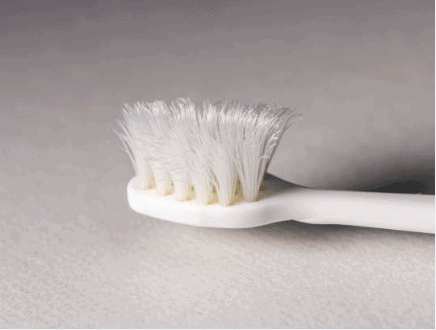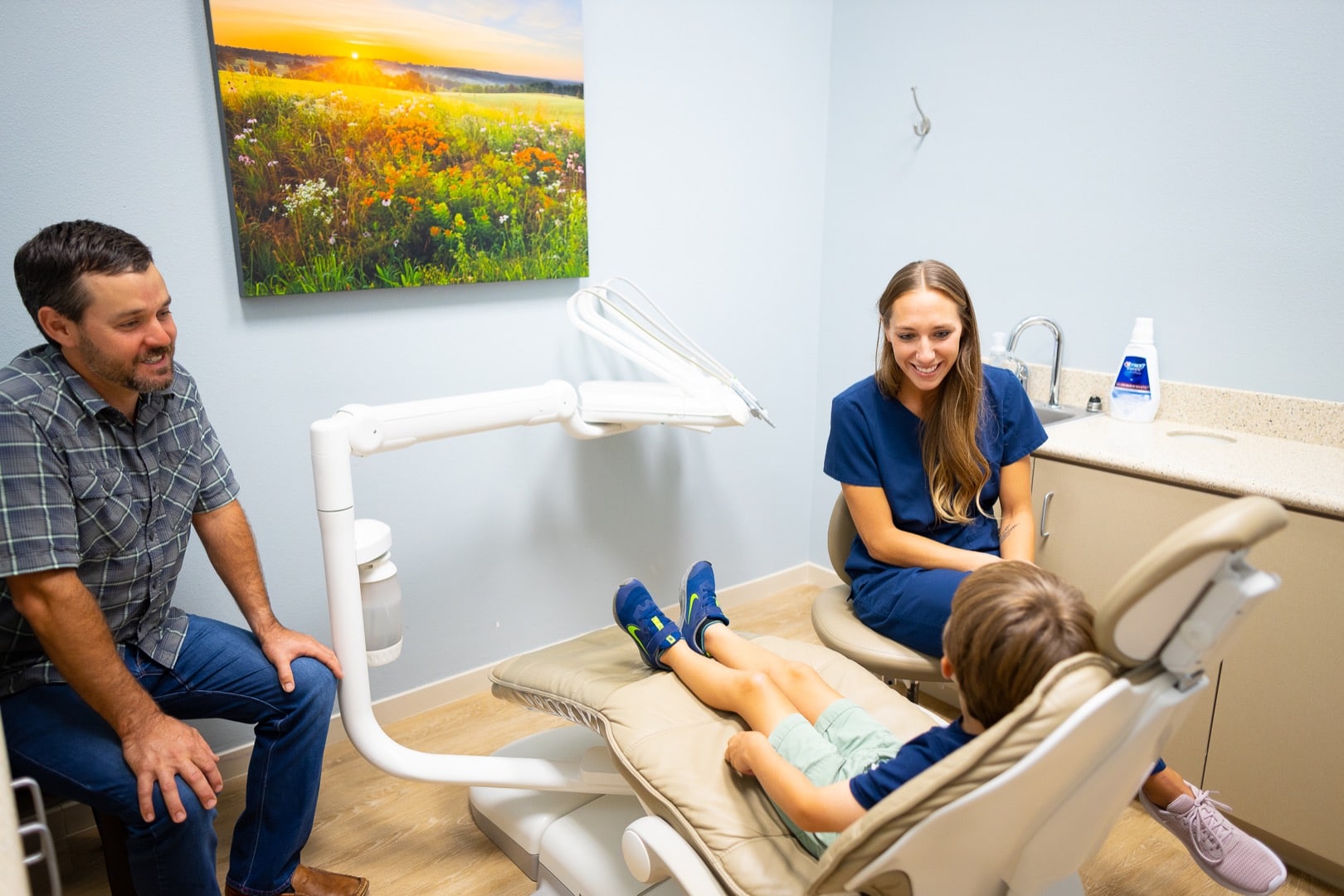What happens if your sore gums aren’t because of gum disease? What could be the cause? Take a look at your toothbrush! Are the bristles frayed? Are they medium or soft bristles?
You may think a toothbrush is a toothbrush, but that isn’t the case. You need to buy the right toothbrush, you need to keep your toothbrush “fresh,” and you need to brush lightly with your toothbrush.
Beavers & Broomfield Family Dentistry treats patients with gum damage due to their toothbrushes. Many people don’t realize how they’re damaging their gums with their toothbrushes or why. Do you know what toothbrush to buy and when to buy it? Let us help you out!

Are You Brushing Too Hard?
What happens if you brush your teeth too hard? Signs of brushing too hard include gums that are red, irritated, damaged, or bleeding after you brush. So if you’re experiencing these, there is a chance you’re brushing too hard.
Some people feel they need to scrub as hard as they can to get their teeth and gums clean. Actually, your toothbrush and toothpaste should do most of the work. Most toothpastes have abrasives in them that, combined with the bristles of the toothbrush, do the scrubbing. That means you don’t need a lot of elbow grease to get your teeth clean.
Gum abrasions or cut gums from brushing too hard are easy to prevent, but when they happen, it can lead to permanent damage . The damage could make your gums sore or could even make them bleed. Prolonged damage can even cause infection to your gums and cause loose teeth. It’s important to clean your gums, but it’s also important not to brush your gums too hard.
If you’re using a manual toothbrush, you may be brushing too hard. Try using an electric toothbrush that does the scrubbing for you. Do not press hard on your teeth and gums while using the electric toothbrush. Not only might you damage your teeth and gums, but you also will slow down the toothbrush, which makes it less effective.
Whatever toothbrush you use, don’t press hard when you brush your teeth and gums. You’ll still get them clean, and you won’t damage your teeth and gums.
How Often Should You Replace Your Toothbrush?
This is a question we get often. Patients often notice their frayed toothbrush isn’t cleaning as well as it once did. That’s because the bristles are worn out on the toothbrush, so of course, they won’t clean as well.
How long do toothbrushes last? In general, you want to replace your toothbrush about every three months. The bristles wear out over time, so changing them out every three months keeps them fresh and allows them to provide the maximum amount of cleaning to your teeth.
Many toothbrushes or toothbrush heads (for electric toothbrushes) come with colored bristles that fade as they are used. When they get to a certain color or fade halfway down the bristles, it indicates that it’s time to change the toothbrush or toothbrush head. So pay attention to your bristles! When they’re frayed or faded, it’s time to change your toothbrush.

What If You Injure Gums From Your Toothbrush?
What can you do if you cut your gums with your toothbrush? What if they bleed after brushing? There are several things you can do to keep this from happening again.
The first step is to apply less pressure when you brush. Replace your toothbrush or toothbrush head to new, soft-bristled toothbrush that will do the scrubbing for you without having to apply pressure.
If your gums start to bleed, start by rinsing them with very cold water. The cold causes the blood vessels to shrink, restricting blood flow and stopping the bleeding. Your gums likely will be sore the next day. Rinsing them with warm saltwater can help soothe them and help them heal faster.
If you try to rinse with an antiseptic or alcohol-based mouthwash, be warned — it’s probably going to sting like the dickins! It will eliminate bacteria and reduce your chances of infection, but the saltwater rinse will help, as well.
If the soreness, irritation and bleeding persisit, call Beavers & Broomfield Family Dentistry. We’ll inspect your gums and see if it’s just from brushing or if you have beginning stages of gum disease.
Why Are My Gums Receding?
When you brush with a worn-out toothbrush or brush too hard, it could cause your gums to recede. In other words, your gums shrink backwards. In some cases, they can recede enough to expose the root of your tooth. This can lead to tooth sensitivity and tooth decay at the root, both of which can be painful.
It is possible to treat receding gums, but the first step is to change your brushing habits and get a new toothbrush. Minor gum recession may be treated with dental bonding or topical antibiotics. Once they’ve receded far enough to expose the root, you likely will need surgical grafts to return the gums to normal. This is why it’s so important to brush properly and with a toothbrush that isn’t worn out.
How to Heal Gums From Brushing Too Hard
How do you help your gums after brushing too hard? If you have swollen gums from brushing or bleeding gums from flossing, there are several at-home remedies for swollen gums that you can try.
Start by brushing and flossing gently so you don’t do further damage. It’s vital to continue to brush and floss not only to prevent tooth decay but also to prevent bacteria from turning damaged gums into infected ones.
Rinse your mouth several times a day with warm salt water. It will soothe your gums and kill bacteria that could worsen them. Make sure the water isn’t too hot. You could scald your gums, and it would take even longer for them to heal.
Apply compresses to your gums when necessary to reduce pain and swelling. A warm compress reduces the pain and stimulates blood flow for faster healing. A cold compress reduces swelling and inflammation.
Don’t use strong mouthwashes or alcohol, which can irritate your gums. Avoid tobacco products, and don’t eat or drink anything too hot that could scald your gums.
Finally, drink lots of water to stimulate saliva production and rinse away bacteria and food particles from your gums. The water may also soothe your gums.
Talk to your dentist if these methods don’t work. We may prescribe a medicated toothpaste or mouthwash to speed up healing. You may need antibiotics if there is a risk of infection. Finally, we may use a technique called scaling and root planing, where we deep clean below the gum line.

Better Brushing and Gum Care in Fayetteville, AR
It’s incredibly important that you brush and floss your teeth at least twice a day. Your brushing technique and what tools you use are also important. Brushing too hard can cause problems such as excessive tooth wear and gum recession.
Brushing with a worn-out toothbrush can be far less effective in removing bacteria and plaque from your teeth, which makes you want to brush harder to compensate. Instead of applying more pressure, try changing out your toothbrush. You will prevent further problems down the road.
If you have gum or tooth issues, schedule an appointment with Beavers & Broomfield Family Dentistry if you’re in the Fayetteville, AR, or Northwest Arkansas area. We can help you learn great oral hygiene and provide you dental care that will protect your teeth and gums for the rest of your life.





